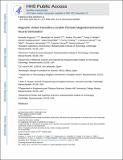Magnetic Vortex Nanodiscs Enable Remote Magnetomechanical Neural Stimulation
Author(s)
Gregurec, Danijela; Senko, Alexander W; Chuvilin, Andrey; Reddy, Pooja D; Sankararaman, Ashwin; Rosenfeld, Dekel; Chiang, Po-Han; Garcia, Francisco; Tafel, Ian; Varnavides, Georgios; Ciocan, Eugenia; Anikeeva, Polina; ... Show more Show less
DownloadAccepted version (1.107Mb)
Open Access Policy
Open Access Policy
Creative Commons Attribution-Noncommercial-Share Alike
Terms of use
Metadata
Show full item recordAbstract
© 2020 American Chemical Society. Magnetic nanomaterials in magnetic fields can serve as versatile transducers for remote interrogation of cell functions. In this study, we leveraged the transition from vortex to in-plane magnetization in iron oxide nanodiscs to modulate the activity of mechanosensory cells. When a vortex configuration of spins is present in magnetic nanomaterials, it enables rapid control over their magnetization direction and magnitude. The vortex configuration manifests in near zero net magnetic moment in the absence of a magnetic field, affording greater colloidal stability of magnetic nanomaterials in suspensions. Together, these properties invite the application of magnetic vortex particles as transducers of externally applied minimally invasive magnetic stimuli in biological systems. Using magnetic modeling and electron holography, we predict and experimentally demonstrate magnetic vortex states in an array of colloidally synthesized magnetite nanodiscs 98-226 nm in diameter. The magnetic nanodiscs applied as transducers of torque for remote control of mechanosensory neurons demonstrated the ability to trigger Ca2+ influx in weak (≤28 mT), slowly varying (≤5 Hz) magnetic fields. The extent of cellular response was determined by the magnetic nanodisc volume and magnetic field conditions. Magnetomechanical activation of a mechanosensitive cation channel TRPV4 (transient receptor potential vanilloid family member 4) exogenously expressed in the nonmechanosensitive HEK293 cells corroborated that the stimulation is mediated by mechanosensitive ion channels. With their large magnetic torques and colloidal stability, magnetic vortex particles may facilitate basic studies of mechanoreception and its applications to control electroactive cells with remote magnetic stimuli.
Date issued
2020Department
Massachusetts Institute of Technology. Research Laboratory of Electronics; McGovern Institute for Brain Research at MIT; Massachusetts Institute of Technology. Department of Materials Science and Engineering; Massachusetts Institute of Technology. Department of Brain and Cognitive SciencesJournal
ACS Nano
Publisher
American Chemical Society (ACS)
Citation
Gregurec, Danijela, Senko, Alexander W, Chuvilin, Andrey, Reddy, Pooja D, Sankararaman, Ashwin et al. 2020. "Magnetic Vortex Nanodiscs Enable Remote Magnetomechanical Neural Stimulation." ACS Nano, 14 (7).
Version: Author's final manuscript